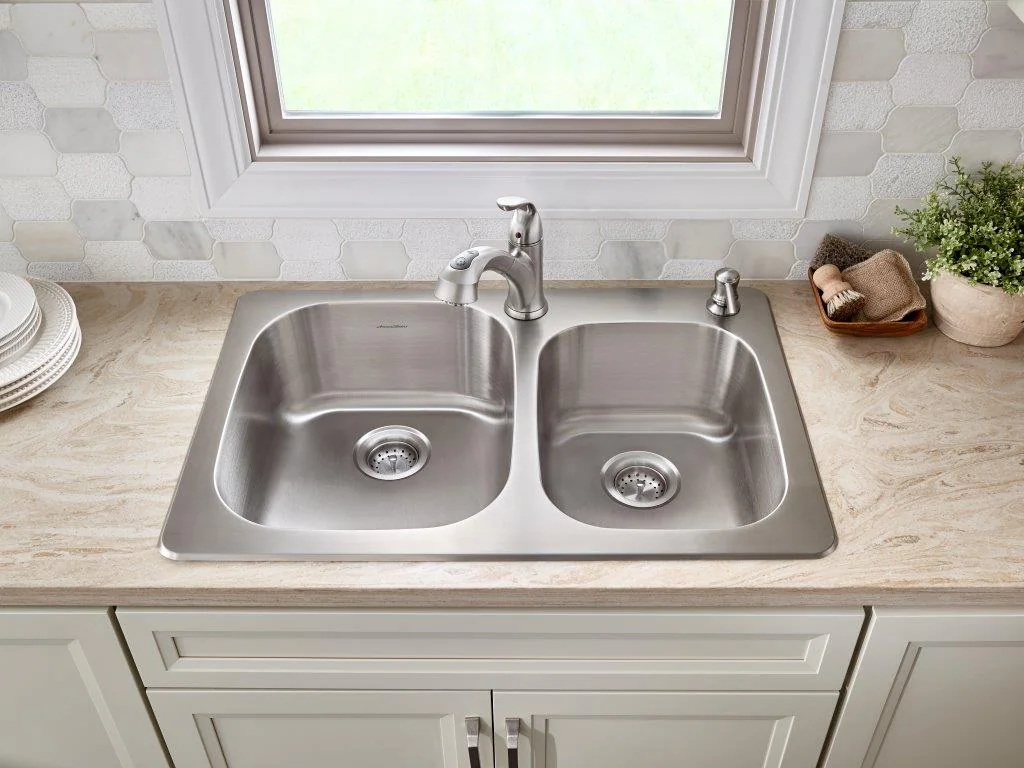What Gauge Stainless Steel Sink is Best for Your Kitchen?
When it comes to choosing a stainless steel sink, one of the most important factors to consider is the gauge. The gauge of a sink refers to its thickness, with lower numbers indicating thicker steel. But what gauge is best for a stainless steel sink? The answer depends on several factors, including your budget, how much use the sink will get, and your personal preferences.
Generally speaking, the most popular gauges for stainless steel sinks are 16 and 18. Both gauges are strong enough to handle daily use and are comparable in cost. However, there are some differences to consider when choosing between the two. A 16-gauge sink is slightly stronger and more durable than an 18-gauge sink, but it may also be more expensive. On the other hand, an 18-gauge sink is slightly thinner and more affordable, but it may not be as durable in the long run.
Understanding Stainless Steel Gauge
As I was researching for my kitchen renovation, I came across the term “stainless steel gauge” and realized it was an important factor to consider when choosing a sink. In simple terms, gauge refers to the thickness of the stainless steel used to make the sink. The lower the gauge number, the thicker the steel.
Most stainless steel sinks are made with a gauge range of 16 to 22. The most common gauges for residential kitchen sinks are 18 and 16. However, some manufacturers also offer sinks in 20 and 22 gauges.
It’s important to note that the gauge of a sink does not necessarily determine its quality. While a lower gauge sink may be thicker and more durable, a higher gauge sink can still be of high quality if made with high-grade stainless steel.
When choosing a sink gauge, consider your usage and needs. A lower gauge sink is ideal for heavy-duty use, such as for commercial kitchens or if you frequently use heavy pots and pans. On the other hand, a higher gauge sink may be suitable for light to medium use, such as for a residential kitchen.
Here’s a table to help you understand the differences between the most common sink gauges:
| Gauge | Thickness (inches) | Best For |
|---|---|---|
| 16 | 0.063 | Heavy-duty use, commercial kitchens |
| 18 | 0.05 | Residential kitchens, everyday use |
| 20 | 0.037 | Light to medium use |
| 22 | 0.031 | Light to medium use, limited budget |
In summary, understanding stainless steel gauge is important when choosing a sink that fits your needs. While a lower gauge sink may be thicker and more durable, a higher gauge sink can still be of high quality if made with high-grade stainless steel. Consider your usage and needs before making a decision.
Why Gauge Matters in Stainless Steel Sinks
As someone who loves to cook, I know how important it is to have a high-quality sink in the kitchen. Stainless steel sinks are a popular choice for their durability, ease of maintenance, and sleek appearance. However, not all stainless steel sinks are created equal, and one of the most important factors to consider when choosing a sink is the gauge.
The gauge of a stainless steel sink refers to the thickness of the steel used to make it. The lower the gauge number, the thicker the steel. Thicker steel is generally more durable and less prone to denting, which is important in a sink that will be used daily.
When it comes to gauges, the most common options are 16, 18, and 20. While all three gauges are suitable for a kitchen sink, there are some differences to consider.
A 16-gauge sink is the thickest option and is often considered the most durable. It can withstand heavy use and is less likely to dent or scratch. However, a thicker gauge also means a higher price tag, so it may not be the best option for those on a tight budget.
An 18-gauge sink is a popular choice for its balance of durability and affordability. It is still thick enough to resist dents and scratches, but it is also more budget-friendly than a 16-gauge sink.
A 20-gauge sink is the thinnest option and is generally the most affordable. While it is still made of stainless steel and can be a good option for those on a tight budget, it is also the most prone to denting and scratching.
In summary, the gauge of a stainless steel sink is an important factor to consider when choosing a sink for your kitchen. While all gauges can be suitable, a thicker gauge generally means a more durable sink. However, a thicker gauge also means a higher price tag, so it’s important to consider your budget as well.
Comparing Different Gauges
When it comes to choosing the right gauge for a stainless steel sink, there are a few factors to consider. The gauge of a sink refers to the thickness of the steel used to make it. Generally, the lower the gauge number, the thicker and more durable the steel.
The most common gauges for stainless steel sinks are 16 and 18. While both are strong enough to handle daily use, there are some differences to consider when choosing between the two. Here’s a comparison of the two gauges:
| Gauge | Thickness | Durability | Cost |
|---|---|---|---|
| 16 | Thicker | More durable | Higher |
| 18 | Thinner | Less durable | Lower |
As you can see, 16 gauge sinks are generally thicker and more durable than 18 gauge sinks. However, they also tend to be more expensive. If you’re looking for a sink that can handle heavy use and don’t mind spending a bit more, a 16 gauge sink may be the way to go.
On the other hand, 18 gauge sinks are thinner and less durable, but they are also more affordable. If you’re on a budget or don’t need a sink that can handle heavy use, an 18 gauge sink may be a good option.
It’s worth noting that there are other factors to consider when choosing a stainless steel sink, such as the sink’s depth, undercoating or pads, grade, and drain placement. But when it comes to gauge, the decision ultimately comes down to your personal preferences and needs.
16 Gauge Stainless Steel Sinks
In my opinion, 16 gauge stainless steel sinks are the best option for heavy-duty use. They are thicker and more durable than 18 and 20 gauge sinks, making them ideal for handling large pots and pans or other heavy items. Additionally, 16 gauge sinks are quieter than 18 and 20 gauge sinks, as they absorb more sound due to their thickness.
One of the main advantages of 16 gauge stainless steel sinks is their durability. They are less likely to dent or scratch than thinner gauge sinks, which can save you money in the long run. They are also less likely to rust or corrode, which is important if you want your sink to last for many years.
Another advantage of 16 gauge stainless steel sinks is their appearance. They have a more substantial look and feel than thinner gauge sinks, which can add to the overall aesthetic of your kitchen. They are also available in a wide range of styles and finishes, so you can find one that matches your decor.
It’s worth noting that 16 gauge stainless steel sinks can be more expensive than thinner gauge sinks. However, I believe that the extra cost is worth it for the added durability and appearance. Plus, if you are planning to use your sink frequently or for heavy-duty tasks, the extra cost will likely pay off in the long run.
Overall, if you are looking for a high-quality, durable, and attractive sink, I would recommend considering a 16 gauge stainless steel sink.
18 Gauge Stainless Steel Sinks
When it comes to choosing the right gauge for a stainless steel sink, 18 gauge is a popular choice for many homeowners. This thickness strikes a balance between durability and affordability, making it a practical option for most kitchens.
One of the benefits of an 18 gauge stainless steel sink is that it’s less expensive than a 16 gauge sink, but still durable enough to withstand daily use. It’s also easier to install and work with due to its lighter weight.
However, it’s important to note that 18 gauge sinks may not be as soundproof as thicker gauges. To combat this, some manufacturers add additional sound-deadening materials to the sink, such as spray-on coatings or undercoatings.
Another thing to consider is the finish of the sink. A brushed finish is a popular choice for 18 gauge stainless steel sinks, as it hides scratches and water spots better than a polished finish. However, a polished finish may give the sink a more modern and sleek look.
Overall, an 18 gauge stainless steel sink is a practical and affordable option for most kitchens. It strikes a balance between durability and cost, making it a popular choice for homeowners.
20 Gauge Stainless Steel Sinks
When it comes to choosing the best gauge for a stainless steel sink, 20 gauge is an option that is worth considering. While it may not be as durable as a 16 or 18 gauge sink, it is still a great option for those who are on a budget or who do not use their sink heavily.
One of the advantages of a 20 gauge sink is that it is typically less expensive than a thicker gauge sink. This makes it a good choice for those who are renovating their kitchen on a tight budget. However, it is important to note that a 20 gauge sink may not last as long as a thicker gauge sink, especially if it is subjected to heavy use.
Another advantage of a 20 gauge sink is that it is lighter than a thicker gauge sink. This can make it easier to install, especially if you are doing the installation yourself. However, it is important to make sure that the sink is properly supported, as a sink that is not properly supported can become damaged over time.
It is also worth noting that a 20 gauge sink may be more prone to dents and scratches than a thicker gauge sink. However, with proper care and maintenance, a 20 gauge sink can last for many years.
In summary, a 20 gauge stainless steel sink is a good option for those who are on a budget or who do not use their sink heavily. While it may not be as durable as a thicker gauge sink, it is still a great choice for those who want a high-quality sink at an affordable price.
Choosing the Right Gauge for Your Kitchen
When it comes to choosing the right gauge for your kitchen sink, there are a few factors to consider. The gauge of a stainless steel sink refers to the thickness of the metal used to make the sink. The lower the gauge number, the thicker the steel and the more durable the sink will be.
The most common gauges for stainless steel sinks are 16, 18, and 20. While each gauge has its own benefits, the best gauge for your kitchen sink will depend on your specific needs and preferences.
16 Gauge
A 16 gauge stainless steel sink is the thickest and most durable option available. It is less likely to dent or scratch and can withstand heavy daily use. However, it is also the most expensive option and may require additional support during installation due to its weight.
18 Gauge
An 18 gauge stainless steel sink is a popular choice for kitchens. It is less expensive than a 16 gauge sink but still durable enough to withstand daily use. It is also lighter in weight and easier to install.
20 Gauge
A 20 gauge stainless steel sink is a less expensive option and may be suitable for those on a tighter budget. However, it is also thinner and more prone to dents and scratches. It may not be the best option for those who use their sink frequently or for heavy-duty tasks.
When choosing the right gauge for your kitchen sink, consider your budget, how often you use your sink, and the types of tasks you typically perform in your sink. A thicker gauge will generally be more durable and long-lasting, but it may come at a higher cost. Ultimately, the best gauge for your kitchen sink will depend on your individual needs and preferences.
Factors to Consider When Choosing a Gauge
When it comes to choosing the best gauge for a stainless steel sink, there are several factors to consider. Here are some important things to keep in mind:
1. Durability
The gauge of a stainless steel sink is a measure of its thickness, with a lower gauge number indicating a thicker steel. Generally, the thicker the steel, the more durable the sink. A thicker gauge sink is less likely to dent or scratch, making it a better choice for high-traffic kitchens.
2. Price
As a general rule, the thicker the gauge of the stainless steel sink, the more expensive it will be. However, it’s important to keep in mind that a higher price doesn’t always mean better quality. It’s important to find a balance between the gauge and the price that fits your budget and needs.
3. Noise Reduction
Thicker gauge stainless steel sinks tend to be quieter than thinner gauge sinks. This is because the thicker steel absorbs more sound, reducing the noise of running water and clanging dishes. If you want a quieter kitchen, a thicker gauge sink may be the best choice.
4. Style
Stainless steel sinks come in a variety of styles and finishes, and the gauge of the sink can affect its appearance. A thicker gauge sink may have a more substantial look and feel, while a thinner gauge sink may have a more streamlined appearance. Consider the overall style of your kitchen when choosing a gauge.
5. Maintenance
Stainless steel sinks are relatively easy to maintain, but thicker gauge sinks may require less maintenance than thinner gauge sinks. Thicker steel is less likely to show scratches and water spots, which can make cleaning and maintenance easier in the long run.
Overall, choosing the best gauge for a stainless steel sink depends on your specific needs and preferences. By considering factors like durability, price, noise reduction, style, and maintenance, you can find a sink that works best for your kitchen.
Conclusion
After researching and analyzing the information available, I have come to the conclusion that the best gauge for a stainless steel sink is either 16 or 18. Both of these gauges are strong enough to handle daily use and are comparable in cost. However, there are some differences to consider when choosing between the two.
If you are looking for a sink that is more durable and less likely to dent or scratch, then a 16 gauge sink may be the best option for you. These sinks are thicker and heavier, which makes them more resistant to damage. On the other hand, if you are looking for a sink that is easier to install and more affordable, then an 18 gauge sink may be the best choice. These sinks are thinner and lighter, which makes them easier to handle and less expensive.
It is important to note that the gauge of a sink is not the only factor to consider when choosing a stainless steel sink. Other factors to consider include the size and shape of the sink, the type of finish, and the overall design. It is also important to choose a sink that is made from high-quality stainless steel, as this will ensure that it is durable and long-lasting.
In summary, when choosing a stainless steel sink, it is important to consider the gauge, as well as other factors such as size, shape, finish, and quality. By taking these factors into account, you can choose a sink that meets your needs and provides you with years of reliable use.





